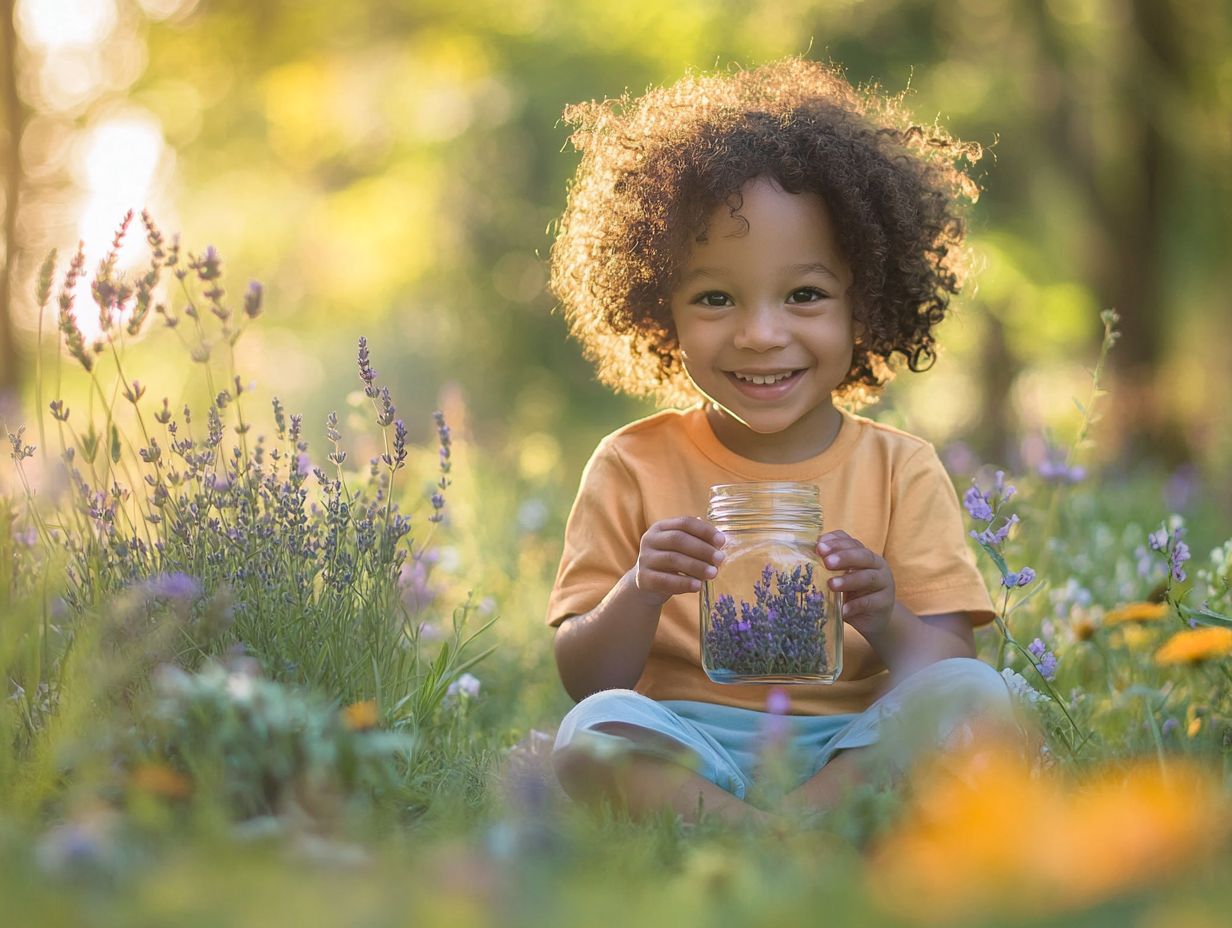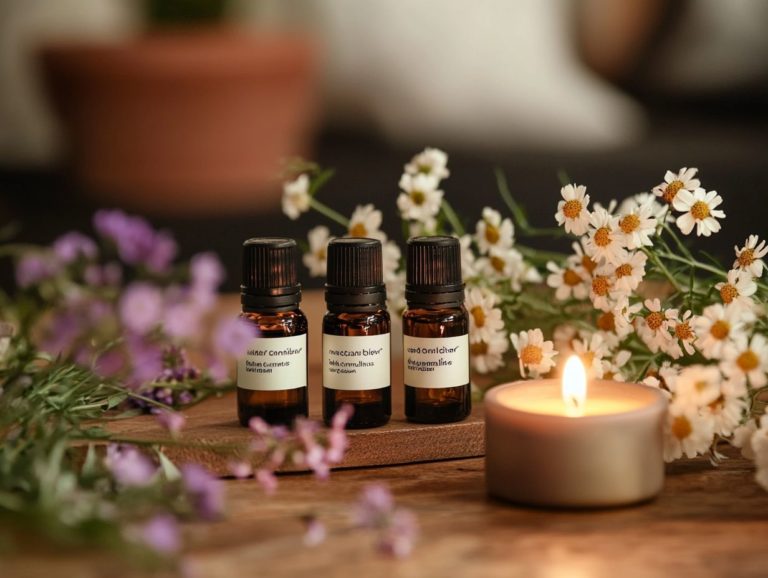Natural Remedies for Anxiety in Children
Anxiety in children has become a significant concern for many parents. It often appears in ways that can be difficult to identify and manage, highlighting the need for effective anxiety treatment options.
This guide will help you understand childhood anxiety. We will delve into common natural remedies like herbal supplements and mindfulness techniques. You ll also discover alternative therapies, such as acupuncture and massage, which can be beneficial.
Creating a supportive environment through clear communication and healthy routines is crucial. Regular physical activity and a balanced diet can greatly benefit your child.
We will also discuss when to seek professional help to ensure your child receives the care they need. Join us now on this exciting journey to nurture calm and resilience in your child s life!
Contents
- Key Takeaways:
- Anxiety in Children
- Common Natural Remedies for Anxiety
- Alternative Therapies for Anxiety
- Creating a Supportive Environment
- Seeking Professional Help
- Frequently Asked Questions
- What are some natural remedies for anxiety in children?
- Can diet play a role in managing anxiety in children?
- Is physical activity beneficial for children with anxiety?
- Are there any natural supplements that can help with anxiety in children?
- What is the role of mindfulness in managing anxiety in children?
- Are there any specific natural remedies for different types of anxiety disorders in children?
Key Takeaways:

- Manage childhood anxiety effectively with natural remedies like herbal supplements and mindfulness techniques.
- Explore alternative therapies, like acupuncture and massage therapy, to help alleviate anxiety in children.
- Create a supportive home environment with parental involvement, communication, and healthy habits. Seek professional help if symptoms persist.
Anxiety in Children
Anxiety in children has become a pressing concern for both parents and health professionals. It can profoundly affect their mental health and emotional well-being.
Various factors contribute to this anxiety, including genetic predisposition, environmental stressors, and developmental challenges. Many children grapple with apprehension and fear in different situations.
It s essential to understand these underlying factors when seeking effective treatment and support strategies. Adopting a comprehensive approach to diagnosis and treatment offers valuable insights to help you manage anxiety symptoms in children effectively.
This method combines different treatments for better results, fostering a supportive environment that nurtures your child’s emotional resilience.
Understanding Childhood Anxiety
Childhood anxiety can manifest in various ways, such as excessive worry and irritability. You might notice physical complaints like stomachaches and headaches.
These symptoms can significantly affect your child’s daily life, potentially interfering with social interactions and academic achievements. The condition can take several forms, including generalized anxiety disorder, separation anxiety, and social anxiety.
Recognizing how anxiety impacts development is essential, as it can lead to lasting effects if left unaddressed. The good news is that cognitive behavioral therapy has proven effective in helping children understand and manage their feelings.
Additionally, strong parental support is crucial. Your reassurance and guidance can empower your child to navigate their fears more effectively.
Common Natural Remedies for Anxiety
Common natural remedies for anxiety include herbal treatments and dietary supplements that have shown effectiveness in alleviating anxiety and enhancing mental well-being.
Many parents seek options like valerian, chamomile, and kava to address their child’s anxiety symptoms through a more holistic approach, exploring nature’s remedies: herbs for anxiety.
In-depth research, including clinical trials and safety assessments, offers essential insights that empower you to make informed decisions regarding anxiety treatment.
Herbal Supplements and Essential Oils
Herbal supplements and essential oils are popular tools for managing anxiety symptoms in children. Substances like lavender, lemon balm, and passion flower can provide compelling benefits, and exploring natural remedies for social anxiety may also be helpful.
These natural remedies are valued for their overall safety and minimal side effects. For instance, lavender oil can help reduce anxiety-related behaviors, allowing children to find calm without the drowsiness often linked to medications. Exploring options like navigating anxiety with natural remedies can provide effective support.
Lemon balm has a rich history of promoting relaxation and improving mood. Research supports its effectiveness in reducing feelings of anxiety.
Passion flower enhances sleep quality and decreases anxiety levels. It s a great option for parents seeking natural solutions for their children.
These herbal options provide potential relief and encourage a more natural therapeutic approach.
Mindfulness and Relaxation Techniques

Mindfulness and relaxation techniques enhance emotional well-being and manage stress in children facing anxiety.
These strategies instill calm and sharpen focus. Engaging in deep breathing exercises helps children tune into their feelings and understand their reactions.
Regular physical activity is an excellent outlet for pent-up energy and stress. Practices like guided meditation promote a tranquil mind.
Combining these approaches nurtures both emotional and physical well-being.
Alternative Therapies for Anxiety
Alternative therapies like acupuncture and massage therapy provide valuable options for parents seeking holistic mental health solutions for their child. These therapies work alongside traditional treatments to foster emotional well-being.
Exploring these alternatives gives your child additional tools to manage anxiety effectively.
Acupuncture and Massage Therapy
Acupuncture and massage therapy promote stress relief and alleviate anxiety symptoms in children. These methods stimulate specific points on the body, enhancing overall well-being.
Research shows acupuncture can reduce anxiety by boosting the production of endorphins and serotonin, which are chemicals that help improve mood. Massage therapy also relaxes the body, improving circulation and reducing muscle tension.
Studies highlight that regular sessions of these therapies can lead to noticeable improvements in anxiety levels. Incorporating these methods into treatment plans empowers children with effective tools for managing anxiety.
Creating a Supportive Environment
Creating a supportive environment is essential for children grappling with anxiety. This nurturing atmosphere fosters emotional well-being and cultivates resilience, empowering them to navigate their feelings with greater ease.
Parental Involvement and Communication
Parental involvement and open communication are essential in guiding you as you help your children manage anxiety. This provides the emotional support and guidance they need during challenging times.
By creating an environment where feelings can be expressed freely, you enable your children to articulate their fears and worries without hesitation. Employing strategies like active listening, validating their emotions, and encouraging problem-solving can significantly boost their confidence in navigating anxious moments.
As a parent, you play a crucial role in teaching coping mechanisms such as mindfulness and relaxation techniques, which can effectively reduce stress. By staying engaged and observant, you can identify triggers and changes in behavior, allowing for timely interventions.
This collaborative approach strengthens your bond with your children and equips them with essential skills for emotional resilience and improved mental health.
Healthy Habits and Routines

Establishing healthy habits and routines is essential for promoting emotional well-being and effectively managing stress in children experiencing anxiety.
Incorporating regular physical activity into their daily lives helps your children boost their physical health and elevate their mood, reducing feelings of tension!
A balanced diet rich in fruits, vegetables, and whole grains fuels their bodies and minds, ensuring they have the energy they need to tackle daily challenges.
Consistent sleep routines are vital; adequate rest supports better emotional regulation and cognitive function, making it easier for them to manage anxiety. Fostering social connections and encouraging open conversations create a supportive environment, enriching their overall emotional stability.
Seeking Professional Help
When a child s anxiety symptoms become overwhelming or significantly disrupt their daily life, seeking professional help is a crucial step for parents. This opens up avenues for effective therapy and options for medication, ensuring that the child receives the comprehensive support they need.
When to Consider Therapy or Medication
Determining when to explore therapy or medication for anxiety treatment can feel daunting. It often hinges on the severity of your child’s symptoms and their overall mental well-being.
Recognizing early signs is essential; these might manifest as persistent worry, avoidance of specific situations, or noticeable shifts in behavior and mood. If these signs disrupt daily life or cause distress, it may be time to seek professional help.
Cognitive-behavioral therapy is a type of therapy that helps change unhelpful thinking and can be effective for many children.
In more severe cases, medication might be recommended, offering relief and enabling more effective coping strategies. Engaging in therapy not only helps your child manage anxiety but also fosters emotional resilience, cultivating a healthier mindset and enhancing their quality of life.
Frequently Asked Questions
What are some natural remedies for anxiety in children?
Some natural remedies for general anxiety relief in children include deep breathing exercises, herbal supplements like chamomile or valerian root, and aromatherapy with calming essential oils such as lavender or peppermint.
Can diet play a role in managing anxiety in children?

Yes! Certain foods can help reduce anxiety in children. Foods rich in omega-3 fatty acids, like salmon and walnuts, improve mood and reduce anxiety. Avoiding caffeine and processed foods high in sugar can also help manage anxiety.
Is physical activity beneficial for children with anxiety?
Absolutely! Regular exercise can help reduce anxiety in children by producing feel-good chemicals in the brain, promoting relaxation, and improving overall mood. Activities like yoga, swimming, and biking can be especially beneficial.
Are there any natural supplements that can help with anxiety in children?
Yes, several natural supplements can help with anxiety in children. Examples include magnesium, vitamin B complex, and L-theanine, as well as the best natural remedies for panic attacks.
Always consult a healthcare professional before giving your child any supplements.
What is the role of mindfulness in managing anxiety in children?
Mindfulness techniques, like meditation and guided imagery, can be beneficial for managing anxiety. These practices help children become more aware of their thoughts and emotions.
As a result, children can better regulate and cope with anxiety.
Are there any specific natural remedies for different types of anxiety disorders in children?
Yes, certain natural remedies may work better for specific anxiety disorders. For example, cognitive-behavioral therapy, a type of therapy that helps change negative thought patterns, is effective for generalized anxiety disorder.
On the other hand, exposure therapy may help children with phobias.
It’s essential to work with a healthcare professional to create the best treatment plan for your child.






